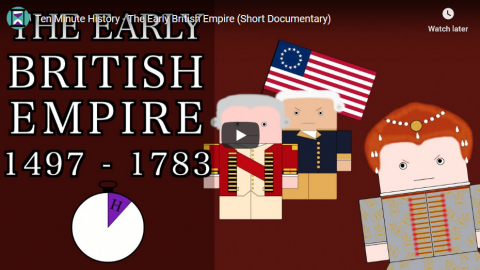Tom Scott
Published 9 Apr 2018As far as I can find, no-one has actually made a International Standard Cup of Tea — ISO 3103 or BS 6008 — for the internet before. Lots of people have talked about it, but that’s easy. Making one? That requires precision … and some specialist equipment.
You can buy a professional tea tasting set from this Amazon UK affiliate link: https://amzn.to/2qfbxyr
Thanks to Morag Hickman for letting me borrow her workshop for last-minute filming! She makes beautiful jewellery, like ring-keepers, dragon necklaces and rings that looks like ocean waves: https://etsy.com/shop/Errant
Update: someone has found an earlier ISO cup of tea on the internet, as part of a German video on tea tasting: https://www.youtube.com/watch?v=utwwk…
(more…)
August 7, 2022
Making an International Standard Cup of Tea
February 28, 2021
Cultural appropriation foods around the world
J.J. McCullough
Published 14 Dec 2019Baguettes in Vietnam! Curry in Japan! Tea in India! Let’s look at the practice of eating food from other countries, which is more widespread than you might think, thanks to imperialism and immigration.
FOLLOW ME:
Support me on Patreon! https://www.patreon.com/jjmccullough
Join my Discord! https://discord.gg/3X64ww7
Follow me on Instagram! https://www.instagram.com/jjmccullough/
Read my latest Washington Post columns: https://www.washingtonpost.com/people…
Visit my Canada Website http://thecanadaguide.com
HASHTAGS:
#food #curry #empire
December 10, 2019
QotD: British breakfast – “Not a snack but a serious meal”
First of all, then, breakfast. Ideally for nearly all British people, and in practice for most of them even now, this is not a snack but a serious meal. The hour at which people have their breakfast is of course governed by the time at which they go to work, but if they were free to choose, most people would like to have breakfast at nine o’clock. In principle the meal consists of three courses, one of which is a meat course. Traditionally it starts with porridge, which is made of coarse oatmeal, sodden and then boiled into a spongy mess: it is eaten always hot, with cold milk (better still, cream) poured over it, and sugar. Breakfast cereals, which are ready-cooked preparations of wheat or rice, taken cold with milk and sugar, are often eaten instead of porridge. After this comes either fish, usually salt fish, or meat in some form, or eggs in some form. The best and most characteristically British form of salt fish is the kipper, which is a herring split open and cured in wood-smoke until it is deep brown colour. Kippers are either grilled or fried. The usual breakfast meat dishes are either fried bacon, with or without fried eggs, grilled kidneys, fried pork sausages, or cold ham. British people favour a lean, mild type of bacon or ham, cured with sugar and nitre rather than with salt. At normal time it is not unusual to eat grilled beef steaks or mutton chops at breakfast, and there are still old-fashioned people who like to start the day with cold roast beef. In some parts of the country, for instance in East Anglia, it is usual to eat cheese at breakfast.
After the meat course comes bread, or more often toast, with butter and orange marmalade. It must be orange marmalade, though honey is a possible substitute. Other kinds of jam are seldom eaten at breakfast, and marmalade does not often appear at other times of [the] day. For the great bulk of British people, the invariable breakfast drink is tea. Coffee in Britain is almost always nasty, either in restaurants or in private houses; the majority of people, though they drink it fairly freely, are uninterested in it and do not know good coffee from bad. Of tea, on the other hand, they are extremely critical, and everyone has his favourite brand and his pet theory as to how it should be made. Tea is always drunk with milk, and it is usual to brew it very strong, about one spoonful of dry tea leaves being allowed for each cup. Most people prefer Indian to Chinese tea, and they like to put sugar in it. Here, however, one comes upon a class distinction, or more exactly a cultural distinction. Virtually all British working-people put sugar in their tea, and indeed will not drink tea without it. Unsweetened tea is an upper-class or middle-class habit, and even in those classes it tends to be associated with a Europeanised palate. If one made a list of the people in Britain who prefer wine to beer, one would probably find that it included most of the people who prefer tea without sugar.
After this solid breakfast – and even now, in a time of rationing, it is usual to eat a fairly large bulk of food, chiefly bread, at breakfast – it is natural that the midday meal should be somewhat lighter than it is in many other countries.
George Orwell, “British Cookery”, 1946. (Originally commissioned by the British Council, but refused by them and later published in abbreviated form.)
September 30, 2019
Ten Minute History – The Early British Empire
History Matters
Published on 26 Sep 2016Twitter: https://twitter.com/Tenminhistory
Patreon: https://www.patreon.com/user?u=4973164This episode of Ten Minute History (like a documentary, only shorter) covers the birth and rise of the British Empire from the reign of Henry VII all the way to the American Revolution. The first part deals with the Tudors and their response to empire in Spain (as well as the Spanish Armada). The second part deals with England’s (and later Britain’s) establishment of its own empire in North America and India. It then concludes with the Seven Years’ War and the American Revolution.
Ten Minute History is a series of short, ten minute animated narrative documentaries that are designed as revision refreshers or simple introductions to a topic. Please note that these are not meant to be comprehensive and there’s a lot of stuff I couldn’t fit into the episodes that I would have liked to. Thank you for watching, though, it’s always appreciated.
July 6, 2019
History Summarized: Hong Kong
Overly Sarcastic Productions
Published on 5 Jul 2019Sometimes small corners of the map can have outsized effects on the surrounding world. Hong Kong is undoubtedly one of History’s greatest examples of big things coming from small beginnings. If you’re curious about Hong Kong’s current political situation, there’s no better place to start than at the beginning.
LEARN MORE about Hong Kong’s current events:
China is Erasing its border with HK: https://www.youtube.com/watch?v=MQyxG…
HK’s huge protests, explained: https://www.youtube.com/watch?v=6_Rdn…Further Historical Reading:
A Modern History of China — Steve Tsang https://www.amazon.com/Modern-History…PATREON: https://www.Patreon.com/OSP
April 15, 2019
Why Are Brits So Obsessed with Tea? – Anglophenia Ep 30
Anglophenia
Published on 3 Jun 2015Anglophenia’s Kate Arnell looks back at the moments in history that made Britain a tea-drinking nation.
April 9, 2019
Blue’s Dumb History Tales
Overly Sarcastic Productions
Published on 8 Mar 2019Please check out That Works for the best blacksmithing on YouTube: https://goo.gl/vXsuFt
What do you get when you cross a month that has 5 Fridays with a historian who can’t do math? This nonsense, apparently.
PATREON: https://www.patreon.com/OSP
January 1, 2018
“A Nice Cup of Tea”, the animated version
I used the original essay as a QotD entry back in September.
H/T to Open Culture for the link.
September 19, 2017
QotD: A Nice Cup of Tea
When I look through my own recipe for the perfect cup of tea, I find no fewer than eleven outstanding points. On perhaps two of them there would be pretty general agreement, but at least four others are acutely controversial. Here are my own eleven rules, every one of which I regard as golden:
First of all, one should use Indian or Ceylonese tea. China tea has virtues which are not to be despised nowadays — it is economical, and one can drink it without milk — but there is not much stimulation in it. One does not feel wiser, braver or more optimistic after drinking it. Anyone who has used that comforting phrase ‘a nice cup of tea’ invariably means Indian tea. Secondly, tea should be made in small quantities — that is, in a teapot. Tea out of an urn is always tasteless, while army tea, made in a cauldron, tastes of grease and whitewash. The teapot should be made of china or earthenware. Silver or Britanniaware teapots produce inferior tea and enamel pots are worse; though curiously enough a pewter teapot (a rarity nowadays) is not so bad. Thirdly, the pot should be warmed beforehand. This is better done by placing it on the hob than by the usual method of swilling it out with hot water. Fourthly, the tea should be strong. For a pot holding a quart, if you are going to fill it nearly to the brim, six heaped teaspoons would be about right. In a time of rationing, this is not an idea that can be realized on every day of the week, but I maintain that one strong cup of tea is better than twenty weak ones. All true tea lovers not only like their tea strong, but like it a little stronger with each year that passes — a fact which is recognized in the extra ration issued to old-age pensioners. Fifthly, the tea should be put straight into the pot. No strainers, muslin bags or other devices to imprison the tea. In some countries teapots are fitted with little dangling baskets under the spout to catch the stray leaves, which are supposed to be harmful. Actually one can swallow tea-leaves in considerable quantities without ill effect, and if the tea is not loose in the pot it never infuses properly. Sixthly, one should take the teapot to the kettle and not the other way about. The water should be actually boiling at the moment of impact, which means that one should keep it on the flame while one pours. Some people add that one should only use water that has been freshly brought to the boil, but I have never noticed that it makes any difference. Seventhly, after making the tea, one should stir it, or better, give the pot a good shake, afterwards allowing the leaves to settle. Eighthly, one should drink out of a good breakfast cup — that is, the cylindrical type of cup, not the flat, shallow type. The breakfast cup holds more, and with the other kind one’s tea is always half cold — before one has well started on it. Ninthly, one should pour the cream off the milk before using it for tea. Milk that is too creamy always gives tea a sickly taste. Tenthly, one should pour tea into the cup first. This is one of the most controversial points of all; indeed in every family in Britain there are probably two schools of thought on the subject. The milk-first school can bring forward some fairly strong arguments, but I maintain that my own argument is unanswerable. This is that, by putting the tea in first and stirring as one pours, one can exactly regulate the amount of milk whereas one is liable to put in too much milk if one does it the other way round.
Lastly, tea — unless one is drinking it in the Russian style — should be drunk WITHOUT SUGAR. I know very well that I am in a minority here. But still, how can you call yourself a true tea-lover if you destroy the flavour of your tea by putting sugar in it? It would be equally reasonable to put in pepper or salt. Tea is meant to be bitter, just as beer is meant to be bitter. If you sweeten it, you are no longer tasting the tea, you are merely tasting the sugar; you could make a very similar drink by dissolving sugar in plain hot water.
Some people would answer that they don’t like tea in itself, that they only drink it in order to be warmed and stimulated, and they need sugar to take the taste away. To those misguided people I would say: Try drinking tea without sugar for, say, a fortnight and it is very unlikely that you will ever want to ruin your tea by sweetening it again.
George Orwell, “A Nice Cup of Tea”, 1946.






